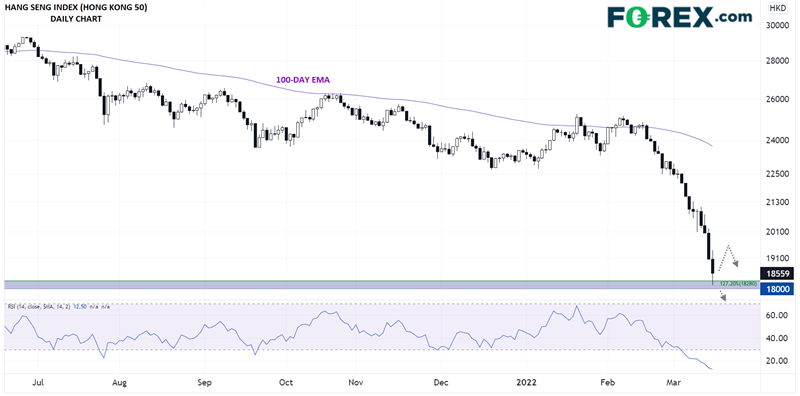Question: What would you call an index that’s fallen in ten of eleven trading days this month, losing nearly 20% of its value over that period?
Answer: The Hang Seng Index (Hong Kong 50)!
Despite the release of better-than-expected retail sales and industrial production data out of China yesterday, Hong Kong’s Hang Seng index fell nearly -6% on Tuesday to close at its lowest level in more than six years near 18,400. More worryingly, the selling was widespread, with more than half of the companies in the index hitting fresh 52-week lows in Tuesday’s trade.
There are (at least) four factors driving the unprecedented selling in Chinese and Hong Kong indices:
1. Regulatory crackdowns on both sides of the Pacific
Chinese authorities have been placing increasing stringent limits on Chinese technology and education firms in recent months, and Monday’s news that tech giant Tencent Holdings Ltd (HK:0700) could face a record anti-money laundering fine suggests that trend is unlikely to abate any time soon.
Meanwhile, the US’s Securities and Exchange Commission (SEC) has picked an auspicious time to start enforcing its “Holding Foreign Companies Accountable Act” and threatening to delist dual-listed Chinese shares. While the initial group of five companies identified lacked top-tier headline stocks that most Americans know, investors fear that stocks like Alibaba (NYSE:BABA), JD.com (NASDAQ:JD) and NetEase (NASDAQ:NTES) could be next; each of those names fell by at least -8% on Tuesday.
2. COVID outbreak in China
At the same time, China’s infamous “zero tolerance” policy for COVID cases is facing its biggest test since the initial height of the pandemic in 2020. Major cities (and key supply chain hubs) like Shenzhen, Dongguan, Shanghai, and potentially even Beijing face lockdowns as the country seeks to limit the spread of the virus. Closer to home for the Hang Seng index, Hong Kong is currently experiencing the highest number globally of new COVID-related deaths per million people, according to Our World in Data. With everything from day-to-day commerce to longer-term business contracts thrown into disarray as the region struggles to get a grip on the pandemic, it’s no surprise that equity indices in the region are struggling.
3. Property market contagion
Last year’s headlines around the collapse of Chinese property manager Evergrande Group (HK:3333) prompted many analysts to speculate about risks to the broader Chinese property market, and when we didn’t see an immediate spread, most market participants understandably shifted their focus elsewhere. Unfortunately, it now looks like the real estate market may be seeing the delayed impact of Evergrande’s collapse, with local government land parcel sales down -72% year-over-year and property company bonds now yielding over 25%, a sign of stress in the market.
4. The Russia connection
Finally, the US reported earlier this week that Russia requested military assistance from China for its ongoing war in Ukraine. Notably, China has denied that it received any such request.
Regardless, China is seen as more sympathetic toward its close ally’s military operations in Ukraine than just about any other major country, and with the battle stretching into its third week with no imminent end in sight, there is a growing risk that China will be forced to more definitively “choose a side” in the conflict, risking either the ire of its close geographical and trading partner to the North or the prospect of economic sanctions from the West.
Hang Seng technical outlook
If you’ve spent the last couple minutes digesting the above factors, the chart of the Hang Seng index won’t reveal any surprises: It’s showing immense selling pressure, and prices are deeply oversold. There is some prospect for a short-term bounce near current levels, as is occurring on Wednesday morning in Asia, where support from the 127.2% Fibonacci extension of the post-COVID recovery and the lows from 2012 and 2016 converge in the lower 18,000s:

Source: TradingView, StoneX
However, as it stands, any bounce is likely to be viewed as a selling opportunity for traders as long as the regulatory, pandemic, property, and geopolitical risks remain. Meanwhile, a confirmed break below support in the 18,000 area would open the door for a bearish continuation toward the 2011 low in the 16,000 zone next.
